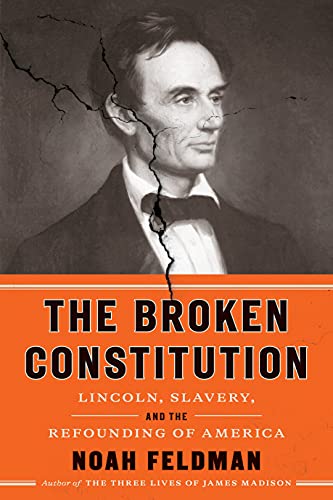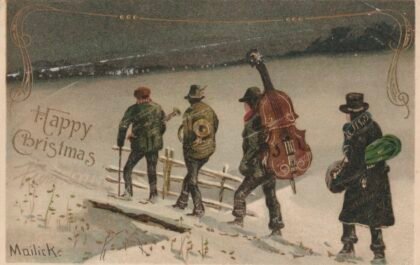
We hold these truths to be self-evident, that all men are created equal, that they are endowed by their Creator with certain unalienable Rights, that among these are Life, Liberty and the pursuit of Happiness.
– Declaration of Independence, 1776
The “Rights” expressed in the Declaration of Independence follow the thinking of English Philosopher John Locke whose revolutionary idea is that we all have “natural rights” by virtue of our humanity.
In 1788, the creation of a new government for this nation under the US Constitution thoroughly ignored this founding principle as it pertained to huge swaths of its people; most notably, nearly one million human beings held in bondage by virtue of their race (this number would grow to nearly four million at the outset of the Civil War in 1861).
In The Broken Constitution: Lincoln, Slavery, and the Refounding of America (2021), Harvard law professor and historian Noah Feldman argues forcefully that the US Constitution was originally framed as an immoral document because its ratification was wholly dependent upon the principle of compromise over the issue of slavery. In this, the Constitution was created to “form a more perfect Union” of the several states and that the forging of the union took precedence over the “natural rights” espoused in 1776.
The Missouri Compromise of 1820, the compromise over tariffs in the 1830s, and the Compromise of 1850 all held together an expanding nation with the explicit purpose of appeasing slaveholders in the Southern states. These arrangements protected the institution of slavery while ensuring that the union remained intact.
As Abraham Lincoln rose to the presidency in 1861, and despite his personal moral opposition to slavery, he did so with a full commitment to the US Constitution’s commitment to keeping the country together.*
This commitment is expressed clearly in Lincoln’s first inaugural address (1861) in which he hoped to assure the South that he had no intention of ending slavery. As Feldman writes, Lincoln believed “[s]lavery was enshrined in the Constitution. Indeed, as he saw it, the preservation of slavery was the condition for the creation and maintenance of the union. Union came first; freedom for African Americans a distant second.”
Lincoln believed his duty was to the Constitution and the “more perfect Union” it aspired to create; while his view that slavery was morally repugnant was irrelevant.
When eleven states seceded from the Union following Lincoln’s election, there were those who believed the Constitution provided no remedy to prevent them from doing so. “Nothing in the Constitution,” as Feldman writes, “authorized war to save the Union.” So, almost single-handedly, Lincoln determined that the oath he had taken to defend the Constitution mandated that he do whatever needed be done to preserve the Union; including waging a war he had no authority to carry out. Thus began Lincoln’s transformation away from defending the letter of the Constitution and toward his defense of the union it established.
Lincoln then suspended habeas corpus, the principle by which an arrested person has a basic right to a judicial hearing. “As a result,” Feldman continues, “thousands of people [war critics and suspected Confederate sympathizers] were arrested and detained without trial, often for months or even years. Scores of newspapers critical of the war were shut down or blocked from being sent through the mail.” He goes on to comment that “Lincoln’s policies and orders created the most extreme suppression of free speech to occur at any time in U.S. history.”
Reading these passages did little for me to confirm Lincoln’s acclaim as one of the greatest presidents in American history. That is, until it becomes clear that Lincoln was living true to his oath and with a keen understanding of the founding, evolution, and subsequent “breaking” of the “compromise” Constitution.
The legal and political dilemma faced by Lincoln – honoring a Constitution which had been agreed to in order to create the union in the first place—gave way to a moral stand against the nation’s original sin. This moral stand is embodied in the Emancipation Proclamation which, when implemented on January 1, 1863—again, completely on his own declaration of executive power and in defiance of the very agreement that had made union possible —he undid the very foundation of the Constitution as it existed.
Lincoln won the war with an abiding commitment to uphold the necessity of union as expressed in the Constitution’s preamble; but he did so by seriously violating the powers vested in him by that very document.
This is Feldman’s “broken Constitution.”
What emerged after the war was a Constitution purged of the compromises made over slavery. In its place, the amendments abolishing slavery (13), guaranteeing equality (14), and protecting the right to vote (15) transformed the compromise Constitution into a moral Constitution which reclaimed the founding principle of natural rights equality within the Declaration of Independence.
The convenience afforded by compromises over slavery gave way to the moral righteousness upon which the country was founded in 1776. “Four score and seven years ago” Lincoln embraced in his Gettysburg address less than a year after issuing the Emancipation Proclamation, “our fathers brought forth on this continent, a new nation, conceived in Liberty, and dedicated to the proposition that all men are created equal.”
So, why does this matter?
Feldman argues that if we honor the original letter and spirit of the Fourteenth Amendment – what the text says and what the authors of the amendment intended—we can begin to understand how rights not explicitly listed can, over time, become as binding as the right to free speech and others enumerated in the Bill of Rights. Today, these include marriage equality, access to contraception, and “bedroom” privacy. Of course, a few weeks ago, reproductive rights would have been included with these unenumerated rights, as well.
Noah Feldman’s analysis of the Fourteenth Amendment and its Refounding of America eloquently frames the legal argument that will help secure—and re-secure—these social rights in the future.
Defending these rights, however, requires an understanding of the Fourteenth Amendment and how it prohibits the states from “deny[ing] to any person within its jurisdiction the equal protection of the laws.” Conservative constitutional scholars often argue that previous liberal courts have gone too far in establishing “rights” that are not explicitly stated in the Constitution. Their reading, however, often tends to dismiss the moral force and temerity of the Fourteenth Amendment; and the transformational effect it had upon re-founding the nation committed to the principle – if not the practice – of equality before the law.**
*Lincoln did not believe the races could live side-by-side and they were equal only in their natural rights as proclaimed in the Declaration of Independence. In other matters, Lincoln saw no prospect of social and political equality and understood the inevitable white resistance to black demands in this regard. In these, he correctly predicted the tensions of Reconstruction, Jim Crow, and the white backlash to the civil rights struggles following World War II.
**For those intrigued by the legal nuances of this refreshing interpretation of the Fourteenth Amendment, I suggest The Original Meaning of the 14th Amendment: Its Letter & Spirit (2021) by Randy E. Barnett & Evan D. Bernick. Be warned, though, that this is an academically-oriented treatise and not necessarily intended for a general audience.





[…] ***https://topanganewtimes.com/2022/07/15/honoring-the-fourteenth/ […]